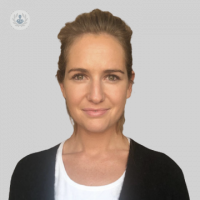Fertility issues: how can counselling help?
Written by:We asked Dr Kate Du Toit, a leading psychologist, how she helps patients struggling with fertility issues with dedicated fertility counselling sessions.

Fertility and the need for fertility counselling often come in two parts; the first being how people have often nurtured the idea of having children for a long time, and to then experience fertility problems, which may feel threatening to that well-formed dream of having a family. The second part of fertility often surround feelings of sadness or bereavement, for example, if a couple has had a traumatic birth, miscarriage or lost their baby. Hence, fertility counselling really covers a lot of ground and it can serve different couples different purposes.
What are common emotions that couples experience when facing fertility problems?
In terms of the emotions that I see in my patients, commonly they are:
- Anxiety (often stemming from the uncertainty of what might happen and when, in terms of their fertility)
- Sadness (over the loss of a pregnancy or of a much desired child)
- Anger (perhaps at the injustice of not being able to conceive)
- Jealousy (towards other people or family who have children)
How does fertility counselling help?
It is normal for people to crave and want certainty in life, not just in relation to fertility and having children, but towards everything; your job, where you live, or even just your weekend plans. Therefore, certainty is frequently what I see my patients looking for in their struggle with fertility. Even if I or their fertility doctor cannot give them this, talking through their emotions and offering them the means of coping with this uncertainty is where fertility counselling can help people.
In a nutshell, you could say that fertility counselling covers the following ground:
- Helping patients to process their emotions.
- Working with the patient to think through the next steps or treatment options they have been presented with.
- Helping each individual in a couple to deal with their stress or emotions. It is not uncommon for fertility counselling to also address elements of what you might see in couples therapy.
- Helping patients to process a possibly traumatic event and the feelings of guilt, blame and social withdrawal that often accompany such events.
It is important to acknowledge that fertility and trying to have children can be a long-term, emotionally draining process. To contextualise this, it can help to put yourself in the shoes of someone struggling to have children.
Sometimes when a couple decides to have children, it does not materialise or it takes a lot longer than expected, especially if fertility issues are encountered. This physical and emotional roadblock to having children can impact their career choices and social lives.
For example, a woman who is unable to get pregnant may struggle to connect with both her friends who already have a growing family and her friends who are still single or not yet ready to have children. In this position, you could feel unsettled, having fallen behind in your own timeline for big life events, like having a family. It is also not uncommon for such couples and women to feel like they have failed as a result, and being the childless couple does come with a certain amount of social stigma in some circles.
This is why there is such an emotional response to fertility problems – it affects your social life, family life, relationships, friendships, career and priorities. Dealing with this is not surprisingly challenging, so having fertility counselling can help patients to navigate this difficult juncture.
What happens during the process of fertility counselling?
This largely depends on the reason for the patient’s fertility counselling, and it also depends on the stage of the process.
For example, if the patient has just started out on their journey to have children, fertility counselling will usually aim to help the patient with acceptance, understanding what happens next for them and correcting any misconceptions they have about their fertility problems, working to eliminate any unhelpful feelings of self-blame and guilt.
For patients who have come in at a later point, for example, if they are going through the lengthy process of fertility treatment, they might have fertility counselling to cope with the social stigma and social avoidance they are going through as a result.
Lastly, I might see patients who have been told definitively that they cannot have children, and so fertility counselling will be looking to help them come to terms with this sad and unsettling news.
At what stage of fertility treatment can you have counselling?
You can seek fertility counselling at any stage of the fertility treatment process, however, for traumatic or tragic cases, you may be directly referred by your fertility doctor for counselling.
Is it better for couples to have counselling together, and if so why?
This really depends and can be reviewed on a case-by-case basis. Sometimes the woman finds it easier to start counselling by herself with their partner participating in just one or two sessions, however, this really does differ between couples.
What advice can you give to couples facing fertility problems on their own, without support?
It is important to know that there is support available, and if you are struggling to cope throughout your fertility journey, speak to your GP or fertility doctor for advice.
However, if you do not feel that counselling is right for you, the following can really help couples facing fertility problems:
- Self-help forums online – whilst advice should sometimes be taken with a pinch of salt, they do provide invaluable support for many people.
- Looking after your well-being and stress levels – whether by taking up yoga, having acupuncture or by practising mindfulness, it is important to manage your stress.
To schedule in an appointment with Dr Kate Du Toit, visit her Top Doctors profile today.


